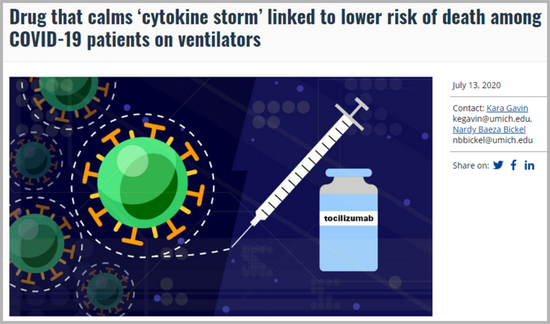Drug calming 'cytokine storm' results in lower risk of COVID-19 death: study

A screenshot taken from news.umich.edu on July 13, 2020 shows the graphics and title of a study posted on the website of the University of Michigan (UM), which explains that critically ill COVID-19 patients who received intravenous tocilizumab to calm an overreacting immune system were 45 percent less likely to die overall. (Xinhua)
Critically ill COVID-19 patients who received intravenous tocilizumab that calms an overreacting immune system were 45 percent less likely to die overall, and were more likely to be out of the hospital or off a ventilator one month after treatment compared with those who didn't receive the drug, according to a study posted on the website of the University of Michigan (UM) on Monday.
The UM researchers based the conclusions on a thorough look back at data from 154 critically ill patients treated at Michigan Medicine, UM's academic medical center, during the first six weeks of COVID-19 pandemic's arrival in Michigan from early March to late April. The analysis looked at patients' records through late May.
During the time, when little was known about what would help COVID-19 patients on ventilators, about half of the studied patients received tocilizumab and half did not. Most received it within the 24-hour period surrounding their intubation.
By the end of the 28-day period after patients went on a ventilator, 18 percent of those who received tocilizumab had died, compared with 36 percent of those who had not. When adjusted for health characteristics, this represented a 45 percent reduction in mortality. Of those still in the hospital at the end of the study period, 82 percent of the tocilizumab patients had come off the ventilator, compared with 53 percent of those who didn't receive the drug.
In all, 54 percent of the tocilizumab patients had developed a secondary infection, mostly ventilator associated pneumonia; 26 percent of those who didn't receive tocilizumab developed such infections. Such "superinfections" usually reduce the chance of survival for COVID-19 patients.
"We kept trying to prove ourselves wrong as signals of benefit emerged in the data, both because of the immediate implications of these data, and in part because of concern about the supply of the medication for other patients," said lead author Emily Somers, an associate professor in the UM Medical School's Department of Internal Medicine and member of the UM Institute for Healthcare Policy and Innovation. "But the difference in mortality despite the increase in secondary infection is quite pronounced, even after accounting for many other factors."
The research group developed treatment guidelines provided to Michigan Medicine physicians in mid-March that identified tocilizumab as a potentially beneficial therapy for the most severely ill COVID-19 patients. Those guidelines also pointed out its risks and the lack of evidence for its use in COVID-19, and recommended a dose of 8 milligrams per kilogram.
The study has been published in the peer-reviewed journal Clinical Infectious Diseases.
